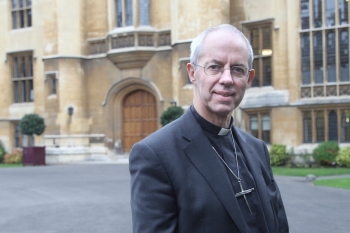 Archbishop of Canterbury Justin Welby. From archbishopofcanterbury.org
Archbishop of Canterbury Justin Welby. From archbishopofcanterbury.org Airport security camera showing Kadiza Sultana, left, Shamima Begum, and Amira Abase on 17 February. From nytimes.com
Airport security camera showing Kadiza Sultana, left, Shamima Begum, and Amira Abase on 17 February. From nytimes.com Young people of different backgrounds choosing to join or coerced into joining ISIS. From independent.co.uk
Young people of different backgrounds choosing to join or coerced into joining ISIS. From independent.co.ukISIS (Islamic State of Iraq and Syria) is terrifying for many reasons. It is particularly frightening because of its macabre appeal to youth around the world, who should have little reason to sneak away to a war-torn region where beheadings, ethnic cleansing, rape, and sectarian massacres are commonplace. The three schoolgirls from Bethnal Green in London (Shamima Begum, Kadiza Sultana, and Amira Abase) that boarded a plane to Istanbul to reach the self-proclaimed caliphate join a disturbingly long list of young men and women seeking to serve ISIS’s cause.
In January, Jayne Huckerby (director of Duke International Human Rights Clinic) told ABC News that “ISIS has been on a very strong female recruitment drive, and women are joining ISIS for a variety of reasons, many of which are the same as men. Feelings of alienation, feelings of inequality. [For] adventure. In some cases, romance. And in many cases too, these women are responding to quite a deliberate call from the Islamic State [ISIS] to have women come and participate in a form of state-building and to make a new country in which they can practice their religion.”
ISIS presents itself to young people as the ultimate expression of both meaning and thrill-seeking. It is true that the self-proclaimed successor to the Abbasid Caliphate presents an alluring package of political stake and killing “bad guys” at the risk of one’s own life: just the way some like it. Those who feel purposeless and adrift see something worth staking their sacred honor on: after all, ISIS is a geopolitical entity that has effectively redrawn the borders of the Middle East and claims to be the successor to the Prophet’s empire. ISIS instils eschatological thrill in its followers with a theologically crude vision of the end of the world. It believes that the arrival of the Mahdi (the prophesied redeemer of Islam) is imminent and that it will defeat “Rome” at the town of Dabiq—hence the need for a holy war in the Middle East. It backs this destructive ideology with a formidable strategy of total war without constraints or compromise, even with Sunni Islamist rivals.
A savvy social media campaign featuring dashing, handsome ISIS fighters, utopian propaganda, and promises of rewards has played its part in portraying allegiance to the terrorist group as an attractive and meaningful way of life. It appeals to disaffected young people around the world because it is portrayed as the vanguard of overwhelming violence against Islam’s enemies. That they are going to such lengths to join this death cult is an urgent signal to the religions of peace that not enough is being done to address their feelings of alienation and anger at society. Such resentments and insecurities (and not necessarily only among youth) have always fuelled political and religious extremism around the world. But in Britain especially, commentators have long lamented that there has been an erosion of security and meaning due to the near-complete collapse of trust in the institutions that used to define British identity.
Depending on where one sits on the political spectrum, culprits like entrenched privilege, mass immigration, economic hardship, and rising inequality have all been named, among many others. But regardless of political allegiance, almost everyone agrees that disgrace after disgrace has plagued British public life: MPs’ expenses, phone hacking by journalists, celebrity pedophiles and sex abusers, banking scandals, politicians offering their services to private interests—the list is numbingly long. The traditional institutions of belonging have condemned themselves and may never regain the level of trust they once had.
The final lines of defense for social cohesion are the monarchy and the Church of England. But even with the Windsor family’s popularity at an all-time high, the Queen and her opinionated heir, the Prince of Wales, are no longer able to hold together something as complex and fragile as the country’s identity. The Church of England remains a powerful force in public life, publishing letters and reports on food banks, the living wage, and other issues in well-intentioned critiques of government policy. Unfortunately, it is hobbled by an almost terminal decline in church numbers and a corresponding lack of interest among the younger generations in even the idea of mainstream religion.
The challenge is twofold. At one level, the shrill shouting and slicker marketing of extremist movements drown out the moderate voices of mainstream, peaceful traditions. At the second level, with societal despair rises a corresponding sense of aimlessness and the temptation to be seduced by this brazen extremism. Therefore, the religions that represent peace in Britain, including Buddhism, should seriously consider becoming more vocal and robust in informing the public about what “meaning,” “belonging,” “purpose,” and other important ideas really signify.
We may never reclaim that nostalgic, concrete sense of identity, but Buddhist guidance can provide grounding in principles like non-attachment and non-self to help people let go of notions of identity altogether. Many feel unhappy and insecure if they “lose” their sense of identity, but Buddhist teachings have the potential to help them realize that identity in itself is impermanent and illusory, leading to a much greater sense of freedom and possibility. Another rubric is ahimsa, the moral refusal to end the life of another being—if one is aware of the world and its interconnectedness, killing another being effectively becomes impossible. This profound teaching is in stark contrast to the crude jihadist message that glorifies murder.
Ultimately, Buddhism teaches perfect equanimity, allowing the practitioner to live without attachment to emotions and thoughts. The true gift of Buddhism empowers one to be free from fear, anger, and ego, to act from the heart without hesitation or hindrance from the three poisons (greed, hatred, and delusion), and to live in the cosmos without worry, desire, or doubt.
The vision of Buddhism is that all sentient beings can become beings of pure compassion, wisdom, and mercy—this is the true path to inner and outer peace. But this needs to be articulated loudly and clearly in British society, as a small but crucial contribution to the united voices necessary to counter social nihilism and the deception of ISIS.

















